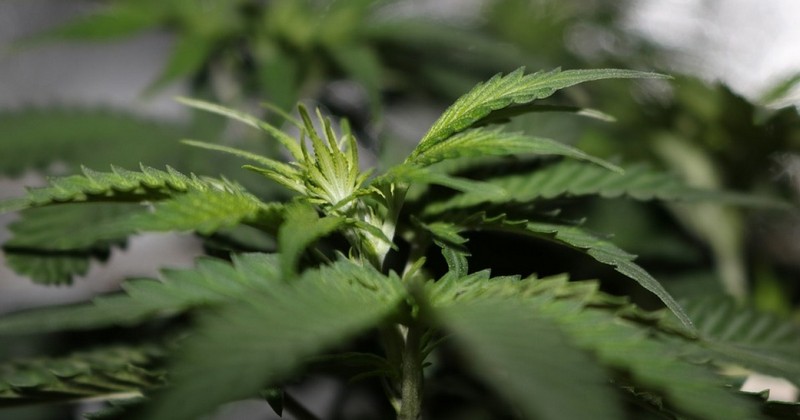These are the 4 beneficial effects of marijuana on Tourette syndrome.

This psychoactive substance has shown efficacy in reducing involuntary tics and obsessiveness.
Cannabis, both in its marijuana form and in other forms.is a psychoactive substance whose effects generate a great deal of controversy at the social level. In addition to being one of the most widely consumed drugs by young people, it poses a health risk by increasing the risk of psychotic break, lung problems and even some types of cancer. It also decreases impulse control and in the long term causes frontal lobe reductions.
However, it has been found that its mechanisms of action may be helpful in alleviating the symptoms of some diseases and disorders, such as Parkinson's disease. A recent study reveals that marijuana use may have beneficial effects on Tourette's syndrome.
Cannabis and marijuana
Marijuana is one of the various presentations given to cannabis, resulting from the chopping and crushing of the leaves and stem of the plant in question. Both marijuana and cannabis in general are psychoactive substances known and used since ancient times. known and used since ancient times, having initially stimulant effect to generate states of relaxation, anesthesia and analgesia. It also causes an increase in hunger and in some cases perceptual alterations.
Although nowadays it is mainly used recreationally, cannabis may have medicinal uses that can contribute to improve the symptomatology and reduce the Pain derived from different diseases and disorders. In spite of this, its consumption must be regulated, since it can generate different health problems and have both short and long term effects.
Some of the cases in which cannabis is used medically are for instance the reduction of pain and discomfort in cases of tumors and of the effect of chemotherapySome types of epilepsy or the one that is treated in this article, the Tourette's syndrome.
Tourette's syndrome
The Tourette's syndrome is a neuropsychological disorder that begins in childhood and that is included within the tic disorders. It is characterized by the appearance of intermittent tics during more than one year that include one or more motor tics and at least one vocal tic that can appear or not jointly.
The tics of these subjects lead them to carry out small movements of spasmodic type, often in extremities, neck, mouth and eyes. With regard to vocal tics is very frequent the presence of coprolalia, emitting insults and swear words of involuntary form. These tics can appear as much during the day as during the dream (especially in the REM), which is altered. It also appears an increase of the disinhibition, aggressiveness and obsessive symptomatology..
It is also usual that the patients with this problem present a high level of anxiety and uneasiness, as well as self-injurious behaviors. Being unable to control their tics, their anxiety increases even more and sometimes they withdraw or are rejected socially because of it.
The causes of this disorder are not fully understood.The existence of alterations in the basal ganglia and frontal cortex or their interconnection has been reflected, both elements being linked to behavioral control.
Cannabis and Tourette's: effects observed in treatment
Recently, research has been carried out in Toronto exploring the possibility that the consumption of cannabis or some of its components can reduce the nervous tics typical of patients with Tourette's syndrome..
For this purpose, a treatment based on cannabis was administered to patients with Tourette's syndrome. treatment based on marijuana was administered to nineteen patients with the disorder. with this disorder, and the results were then observed. The tics decreased in sixty percent of the cases, eighteen of the nineteen participants noticing a high level of improvement. In addition, the level of tension and anxiety typical of individuals with this disorder was reduced.
However, in a large part of them the administration of cannabis had side effects, mostly a decrease in the ability to concentrate and an increase in drowsiness.
Both in this and in other experiments it seems that cannabis has an effect that decreases the activation of involuntary tics.. On the other hand, the same effect has also been seen in other symptoms, such as obsessiveness, anxiety and irritability that these people tend to suffer are reduced (although other studies have reflected opposite results). These are 4 beneficial effects with which this substance could improve the quality of life of patients with this disorder by means of drugs based on this active ingredient.
These results are largely explained by the presence of cannabinoid receptors in the basal ganglia, structures that in patients with Tourette's syndrome have an altered function.
More research is needed
Although the data reflected by this study are promising, it should be kept in mind that it has been carried out with a very limited sample (of nineteen people), so that the observations obtained will have to be verified. the observations obtained will need to be verified in further studies.. Likewise, the possibility of complications not observed during the investigation must also be taken into account. Nor was a control group used, so that the evidence cannot be contrasted with other patients to whom placebo was applied.
Nevertheless, the conclusions of this study could serve to open a way to to open a pathway that would allow the creation of cannabis-derived medication. that would allow the reduction of the symptomatology of this syndrome.
(Updated at Apr 14 / 2024)